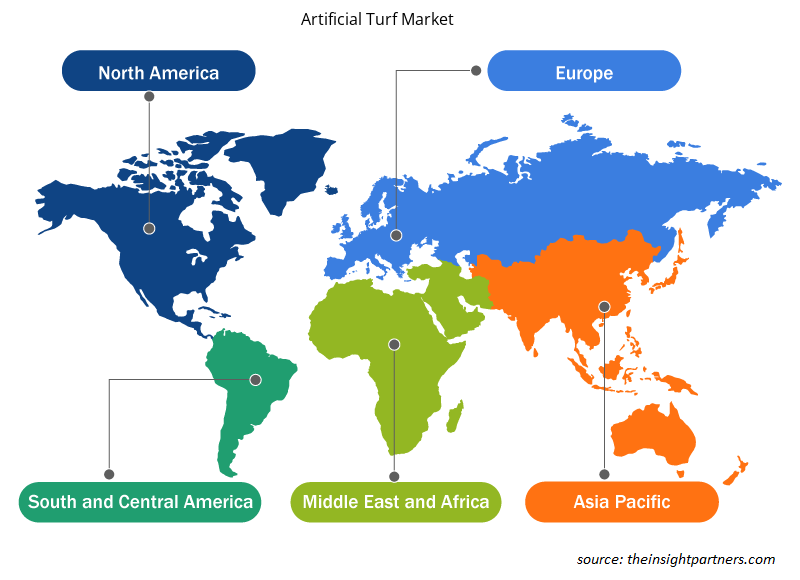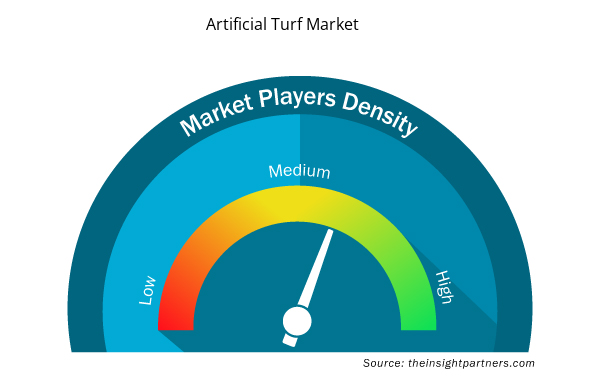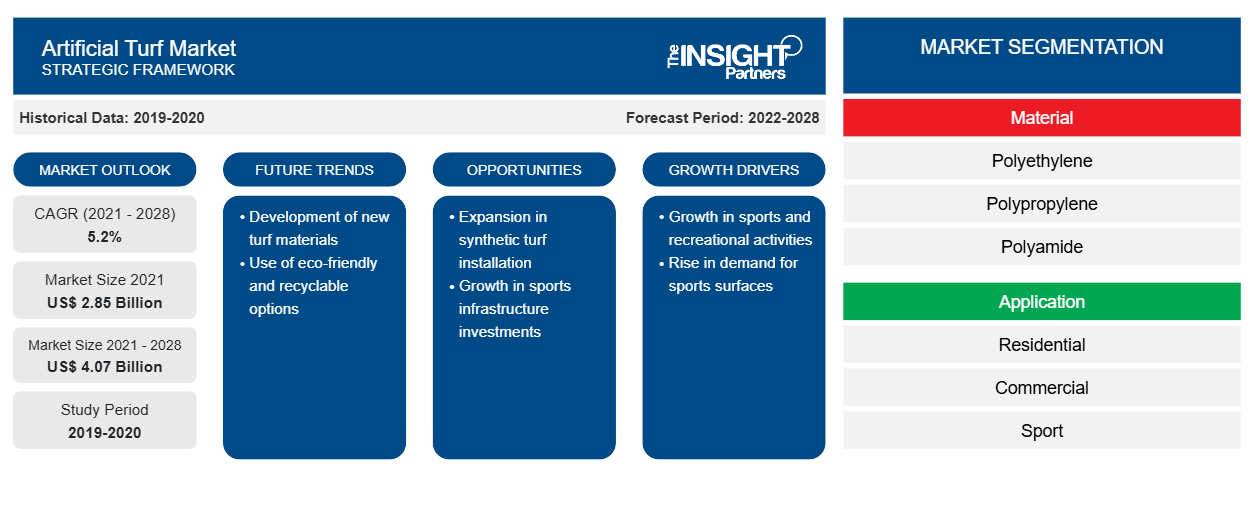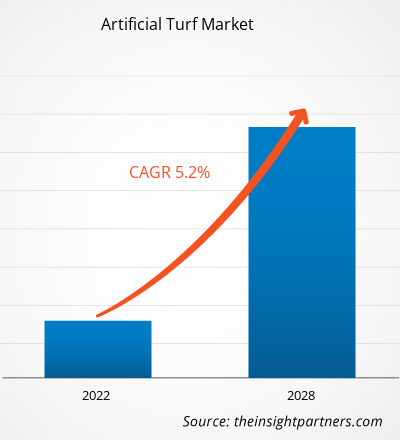El mercado de césped artificial se valoró en 2.847,28 millones de dólares en 2021 y se proyecta que alcance los 4.067,36 millones de dólares en 2028. Se espera que crezca a una CAGR del 5,2% entre 2021 y 2028. CAGR of 5.2% from 2021 to 2028.
El césped artificial, fabricado a partir de fibras sintéticas, imita el césped natural. Las materias primas para la producción de césped artificial incluyen polietileno (PE), polipropileno (PP), poliamida (nailon), compuestos de caucho, espuma de poliéster, diferentes colores y otros aditivos. La calidad de las materias primas es fundamental para el rendimiento del césped.
El mercado mundial de césped artificial se analiza en función del material, la aplicación y la geografía. En 2020, Asia Pacífico tuvo la mayor participación en los ingresos del mercado mundial de césped artificial. El principal factor del crecimiento del mercado de césped artificial en Asia Pacífico es el uso cada vez mayor de césped artificial en el sector doméstico. Las diversas ventajas del césped artificial, como el menor uso de agua y productos químicos, el bajo mantenimiento, la ausencia de riego y la resistencia a la intemperie, contribuyen a la alta demanda de césped artificial en las instalaciones deportivas. Además, la creciente globalización y el crecimiento de la industria de la construcción también favorecen el crecimiento del mercado del césped artificial. Además, los actores del mercado de esta región han invertido fuertemente en iniciativas de I+D, contribuyendo al desarrollo de varios productos innovadores, lo que está ayudando a este mercado regional.
Personalice este informe según sus necesidades
Obtendrá personalización en cualquier informe, sin cargo, incluidas partes de este informe o análisis a nivel de país, paquete de datos de Excel, así como también grandes ofertas y descuentos para empresas emergentes y universidades.
- Obtenga las principales tendencias clave del mercado de este informe.Esta muestra GRATUITA incluirá análisis de datos, desde tendencias del mercado hasta estimaciones y pronósticos.
Impacto de la pandemia de COVID-19 en el mercado del césped artificial
La pandemia de COVID-19 trajo consigo desafíos sin precedentes para muchas industrias, incluida la industria de productos químicos y materiales. Debido al confinamiento a nivel nacional y las restricciones fronterizas, las cadenas de suministro se vieron completamente interrumpidas. Esto ha afectado a la producción y distribución de varios productos. Muchas áreas de recreación y parques infantiles han estado cerrados debido al virus, lo que ha provocado un aumento en las mejoras del hogar en todo el mundo. Según Synthetic Grass Warehouse, los contratistas de césped artificial están experimentando ganancias en las ventas de hasta un 30% a partir de 2020. Las aplicaciones en campos deportivos representaron el 63% del césped instalado en 2020 y se prevé que sigan siendo el área de aplicación más grande durante el período de pronóstico. Sin embargo, el césped en aplicaciones paisajísticas está creciendo a un ritmo rápido. En un futuro cercano, se espera que las plataformas de comercio electrónico ganen un impulso significativo en la venta de varios productos esenciales y no esenciales, especialmente césped artificial.
Perspectivas del mercado
Demanda creciente de césped artificial en la industria del deporte y creciente número de estadios
El césped artificial es adecuado para varios deportes, pero se usa comúnmente para béisbol, fútbol americano, lacrosse, rugby y fútbol. En 2021, el Bank of America Stadium decidió cambiar de césped natural a césped artificial. Tepper Sports & Entertainment anunció que dejaría de usar césped natural y usaría FieldTurf antes de la temporada 2021 de los Carolina Panthers. El BC Place Stadium también tendrá un nuevo campo de césped en Canadá a fines de enero de 2022. Además, han surgido campos de césped artificial en ciudades y pueblos de países como la India. Por lo tanto, la creciente demanda de césped artificial en la industria del deporte y un número cada vez mayor de estadios que usan césped artificial están impulsando considerablemente el mercado mundial de césped artificial.
Información sobre aplicaciones
Según la aplicación, el mercado mundial de césped artificial se ha segmentado en residencial, comercial y deportivo. El segmento deportivo tuvo la mayor participación del mercado mundial de césped artificial en 2020. El césped artificial se usa ampliamente en campos deportivos. Se utiliza principalmente para proporcionar una superficie adecuada para deportes que se practican en césped en áreas donde el mantenimiento del césped natural es difícil o no puede crecer. La alta demanda de césped artificial en la industria deportiva se debe principalmente a varios factores, como el fácil mantenimiento, más tiempo de juego, etc.
Algunos de los actores clave en el mercado global de césped artificial son The Dow Chemical Company; Tarkett; Act Global; CCGrass; TenCate Grass; SIS Pitches; Victoria PLC; GreenFields BV; HATKO; y Hellas Construction, Inc. Estos actores se centran principalmente en varias estrategias, como lanzamientos de nuevos productos, expansión y fusiones y adquisiciones, para su expansión.
Perspectivas regionales del mercado del césped artificial
Los analistas de Insight Partners explicaron en detalle las tendencias y los factores regionales que influyen en el mercado de césped artificial durante el período de pronóstico. Esta sección también analiza los segmentos y la geografía del mercado de césped artificial en América del Norte, Europa, Asia Pacífico, Oriente Medio y África, y América del Sur y Central.

- Obtenga datos regionales específicos para el mercado de césped artificial
Alcance del informe sobre el mercado del césped artificial
| Atributo del informe | Detalles |
|---|---|
| Tamaño del mercado en 2021 | US$ 2.85 mil millones |
| Tamaño del mercado en 2028 | US$ 4.07 mil millones |
| CAGR global (2021-2028) | 5,2% |
| Datos históricos | 2019-2020 |
| Período de pronóstico | 2022-2028 |
| Segmentos cubiertos | Por material
|
| Regiones y países cubiertos | América del norte
|
| Líderes del mercado y perfiles de empresas clave |
|
Densidad de actores del mercado de césped artificial: comprensión de su impacto en la dinámica empresarial
El mercado del césped artificial está creciendo rápidamente, impulsado por la creciente demanda de los usuarios finales debido a factores como la evolución de las preferencias de los consumidores, los avances tecnológicos y una mayor conciencia de los beneficios del producto. A medida que aumenta la demanda, las empresas amplían sus ofertas, innovan para satisfacer las necesidades de los consumidores y aprovechan las tendencias emergentes, lo que impulsa aún más el crecimiento del mercado.
La densidad de actores del mercado se refiere a la distribución de las empresas o firmas que operan dentro de un mercado o industria en particular. Indica cuántos competidores (actores del mercado) están presentes en un espacio de mercado determinado en relación con su tamaño o valor total de mercado.
Las principales empresas que operan en el mercado del césped artificial son:
- La compañía química Dow
- Tarkett
- Actuar globalmente
- C.C.Grass
- Césped TenCate
Descargo de responsabilidad : Las empresas enumeradas anteriormente no están clasificadas en ningún orden particular.

- Obtenga una descripción general de los principales actores clave del mercado de césped artificial
Informe Destacado
- Tendencias progresivas de la industria en el mercado del césped artificial para ayudar a los actores a desarrollar estrategias efectivas a largo plazo
- Estrategias de crecimiento empresarial adoptadas por los mercados desarrollados y en desarrollo
- Análisis cuantitativo del mercado de césped artificial de 2019 a 2028
- Estimación de la demanda mundial de césped artificial
- Análisis de las cinco fuerzas de Porter para ilustrar la eficacia de los compradores y proveedores que operan en la industria
- Avances recientes para comprender el escenario competitivo del mercado
- Tendencias y perspectivas del mercado, así como factores que impulsan y restringen el crecimiento del mercado del césped artificial
- Asistencia en el proceso de toma de decisiones destacando las estrategias de mercado que sustentan el interés comercial, lo que conduce al crecimiento del mercado.
- El tamaño del mercado de césped artificial en varios nodos
- Descripción detallada y segmentación del mercado, así como de la dinámica de la industria del césped artificial.
- Tamaño del mercado de césped artificial en varias regiones con prometedoras oportunidades de crecimiento
Mercado mundial de césped artificial
Material
- Polietileno
- Polipropileno
- Poliamida
- Otros
Solicitud
- Residencial
- Comercial
- Deporte
Perfiles de empresas
- La compañía química Dow
- Tarkett
- Actuar globalmente
- C.C.Grass
- Césped TenCate
- Lanzamientos del SIS
- Sociedad Anónima Victoria
- Campos verdes BV
- sombrero
- Construcción Hellas, Inc.
- Análisis histórico (2 años), año base, pronóstico (7 años) con CAGR
- Análisis PEST y FODA
- Tamaño del mercado Valor/volumen: global, regional, nacional
- Industria y panorama competitivo
- Conjunto de datos de Excel



Report Coverage
Revenue forecast, Company Analysis, Industry landscape, Growth factors, and Trends

Segment Covered
This text is related
to segments covered.

Regional Scope
North America, Europe, Asia Pacific, Middle East & Africa, South & Central America

Country Scope
This text is related
to country scope.
Preguntas frecuentes
Europe is estimated to register the fastest CAGR in the global artificial turf market over the forecast period. With the presence of various artificial turf brands, Europe has been one of the key regions for the global artificial turf market. Europe is anticipated to witness a growing demand for artificial turf during the forecast period, owing to the increasing number of stadiums in the region.
The sports segment held the largest share of the artificial turf market in 2021. It is one of the most crucial application segments of artificial turf and is most often used for baseball, football, rugby, soccer, lacrosse, and others.
The sports segment is the fastest-growing segment in the global artificial turf market during the forecasted period. Artificial turf is also commonly used in sports stadiums and arenas. There is a high demand for artificial turf from the sports industry due to easy maintenance and more playing time.
The polyethylene segment held the largest share of the global artificial turf market in 2021. Polyethylene is one of the most commonly used materials in the artificial turf industry. Polyethylene grass is ideal for front and backyard applications, sports, and pets due to a combination of softness, realism, and the lack of moisture absorption.
The major players operating in the global artificial turf market are The Dow Chemical Company; Tarkett; Act Global; CCGrass; TenCate Grass; SIS Pitches; Victoria PLC; GreenFields BV; HATKO; Hellas Construction, Inc.; among others.
In 2021, Asia Pacific held the largest share of the global artificial turf market. In Asia-Pacific, the demand for artificial turf is increasing, mainly due to the rising use of artificial turf in the residential sector. Moreover, the rise in residential and commercial infrastructural facilities across the region is driving market growth.
Trends and growth analysis reports related to Chemicals and Materials : READ MORE..
The List of Companies - Artificial Turf Market
- The Dow Chemical Company
- Tarkett
- Act Global
- CCGrass
- TenCate Grass
- SIS Pitches
- Victoria PLC
- GreenFields BV
- HATKO
- Hellas Construction, Inc.
The Insight Partners performs research in 4 major stages: Data Collection & Secondary Research, Primary Research, Data Analysis and Data Triangulation & Final Review.
- Data Collection and Secondary Research:
As a market research and consulting firm operating from a decade, we have published and advised several client across the globe. First step for any study will start with an assessment of currently available data and insights from existing reports. Further, historical and current market information is collected from Investor Presentations, Annual Reports, SEC Filings, etc., and other information related to company’s performance and market positioning are gathered from Paid Databases (Factiva, Hoovers, and Reuters) and various other publications available in public domain.
Several associations trade associates, technical forums, institutes, societies and organization are accessed to gain technical as well as market related insights through their publications such as research papers, blogs and press releases related to the studies are referred to get cues about the market. Further, white papers, journals, magazines, and other news articles published in last 3 years are scrutinized and analyzed to understand the current market trends.
- Primary Research:
The primarily interview analysis comprise of data obtained from industry participants interview and answers to survey questions gathered by in-house primary team.
For primary research, interviews are conducted with industry experts/CEOs/Marketing Managers/VPs/Subject Matter Experts from both demand and supply side to get a 360-degree view of the market. The primary team conducts several interviews based on the complexity of the markets to understand the various market trends and dynamics which makes research more credible and precise.
A typical research interview fulfils the following functions:
- Provides first-hand information on the market size, market trends, growth trends, competitive landscape, and outlook
- Validates and strengthens in-house secondary research findings
- Develops the analysis team’s expertise and market understanding
Primary research involves email interactions and telephone interviews for each market, category, segment, and sub-segment across geographies. The participants who typically take part in such a process include, but are not limited to:
- Industry participants: VPs, business development managers, market intelligence managers and national sales managers
- Outside experts: Valuation experts, research analysts and key opinion leaders specializing in the electronics and semiconductor industry.
Below is the breakup of our primary respondents by company, designation, and region:

Once we receive the confirmation from primary research sources or primary respondents, we finalize the base year market estimation and forecast the data as per the macroeconomic and microeconomic factors assessed during data collection.
- Data Analysis:
Once data is validated through both secondary as well as primary respondents, we finalize the market estimations by hypothesis formulation and factor analysis at regional and country level.
- Macro-Economic Factor Analysis:
We analyse macroeconomic indicators such the gross domestic product (GDP), increase in the demand for goods and services across industries, technological advancement, regional economic growth, governmental policies, the influence of COVID-19, PEST analysis, and other aspects. This analysis aids in setting benchmarks for various nations/regions and approximating market splits. Additionally, the general trend of the aforementioned components aid in determining the market's development possibilities.
- Country Level Data:
Various factors that are especially aligned to the country are taken into account to determine the market size for a certain area and country, including the presence of vendors, such as headquarters and offices, the country's GDP, demand patterns, and industry growth. To comprehend the market dynamics for the nation, a number of growth variables, inhibitors, application areas, and current market trends are researched. The aforementioned elements aid in determining the country's overall market's growth potential.
- Company Profile:
The “Table of Contents” is formulated by listing and analyzing more than 25 - 30 companies operating in the market ecosystem across geographies. However, we profile only 10 companies as a standard practice in our syndicate reports. These 10 companies comprise leading, emerging, and regional players. Nonetheless, our analysis is not restricted to the 10 listed companies, we also analyze other companies present in the market to develop a holistic view and understand the prevailing trends. The “Company Profiles” section in the report covers key facts, business description, products & services, financial information, SWOT analysis, and key developments. The financial information presented is extracted from the annual reports and official documents of the publicly listed companies. Upon collecting the information for the sections of respective companies, we verify them via various primary sources and then compile the data in respective company profiles. The company level information helps us in deriving the base number as well as in forecasting the market size.
- Developing Base Number:
Aggregation of sales statistics (2020-2022) and macro-economic factor, and other secondary and primary research insights are utilized to arrive at base number and related market shares for 2022. The data gaps are identified in this step and relevant market data is analyzed, collected from paid primary interviews or databases. On finalizing the base year market size, forecasts are developed on the basis of macro-economic, industry and market growth factors and company level analysis.
- Data Triangulation and Final Review:
The market findings and base year market size calculations are validated from supply as well as demand side. Demand side validations are based on macro-economic factor analysis and benchmarks for respective regions and countries. In case of supply side validations, revenues of major companies are estimated (in case not available) based on industry benchmark, approximate number of employees, product portfolio, and primary interviews revenues are gathered. Further revenue from target product/service segment is assessed to avoid overshooting of market statistics. In case of heavy deviations between supply and demand side values, all thes steps are repeated to achieve synchronization.
We follow an iterative model, wherein we share our research findings with Subject Matter Experts (SME’s) and Key Opinion Leaders (KOLs) until consensus view of the market is not formulated – this model negates any drastic deviation in the opinions of experts. Only validated and universally acceptable research findings are quoted in our reports.
We have important check points that we use to validate our research findings – which we call – data triangulation, where we validate the information, we generate from secondary sources with primary interviews and then we re-validate with our internal data bases and Subject matter experts. This comprehensive model enables us to deliver high quality, reliable data in shortest possible time.


 Obtenga una muestra gratuita de este informe
Obtenga una muestra gratuita de este informe